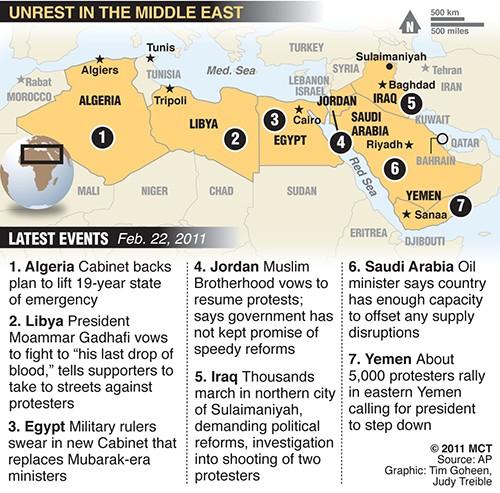CAIRO — A defiant Libyan strongman Moammar Gadhafi vowed Tuesday not to resign and denounced the anti-government protesters who have challenged his regime as “”greasy rats”” and “”drug-fueled mice”” who deserve to be executed.
“”These gangs are cockroaches,”” he said. “”They’re nothing. They’re not 1 percent of the Libyan people.””
In a lengthy address on state TV, Gadhafi, who has ruled since 1969, stood in the ruins of a barracks in Tripoli that was bombed by U.S. warplanes in 1986. He waved his fist and shouted, vowing to die a martyr and urging his supporters to rise up to help the military crush the popular uprising.
The U.N. Security Council called an emergency meeting as Libya descended into further chaos Tuesday amid reports that Gadhafi’s regime used warplanes, helicopter gunships and foreign mercenaries against mounting anti-government demonstrations, witnesses and diplomats said.
The Security Council met in closed-door session in New York to discuss the crackdown against mostly unarmed opposition forces in and around Tripoli, the Libyan capital.
Condemnation poured in from around the world, including from many of Libya’s own top diplomats. Libya’s ambassadors to the United States, China, India and Malaysia resigned. The deputy ambassador to the U.N. denounced the attacks as genocide.
“”Tripoli is burning,”” Ali Aujali, who stepped down as Libya’s ambassador to Washington, told ABC News. He said he no longer wanted to serve a “”dictatorship.””
“”We have never seen a government bomb its own people like this,”” Ali Essawi, who quit as envoy to India, told al-Jazeera television. The envoy said Gadhafi “”lost his legitimacy”” and called for him to step down.
A defiant Gadhafi also appeared briefly on state TV in the early morning hours to deny reports that he had fled the country. He did not refer to the protests.
“”Don’t believe the dogs in the media,”” the mercurial strongman said, holding a large umbrella and wearing a cap with furry ear flaps. “”I’m still here.””
Most communications were down, and reliable information was sketchy. But numerous reports suggested pro-regime militiamen and paid African mercenaries were firing indiscriminately into crowds, sealing off neighborhoods and shooting from rooftops.
In the Fashloum district, an impoverished area that is an anti-government stronghold, militiamen shot any “”moving human being”” with live ammunition and blocked ambulances so the wounded were left in the streets, an unnamed resident told the Associated Press.
Refugees poured out of the country through border crossings into Egypt in the east and Tunisia in the west. Many said they were robbed by armed gangs or government militia on the roads.
Aid convoys with doctors, medical workers and supplies waited in lines to cross into Libya. There were said to be critical shortages of blood.
Opposition forces consolidated control over eastern Libya, burning police stations, military commands and intelligence offices, according to witnesses and media reports.









